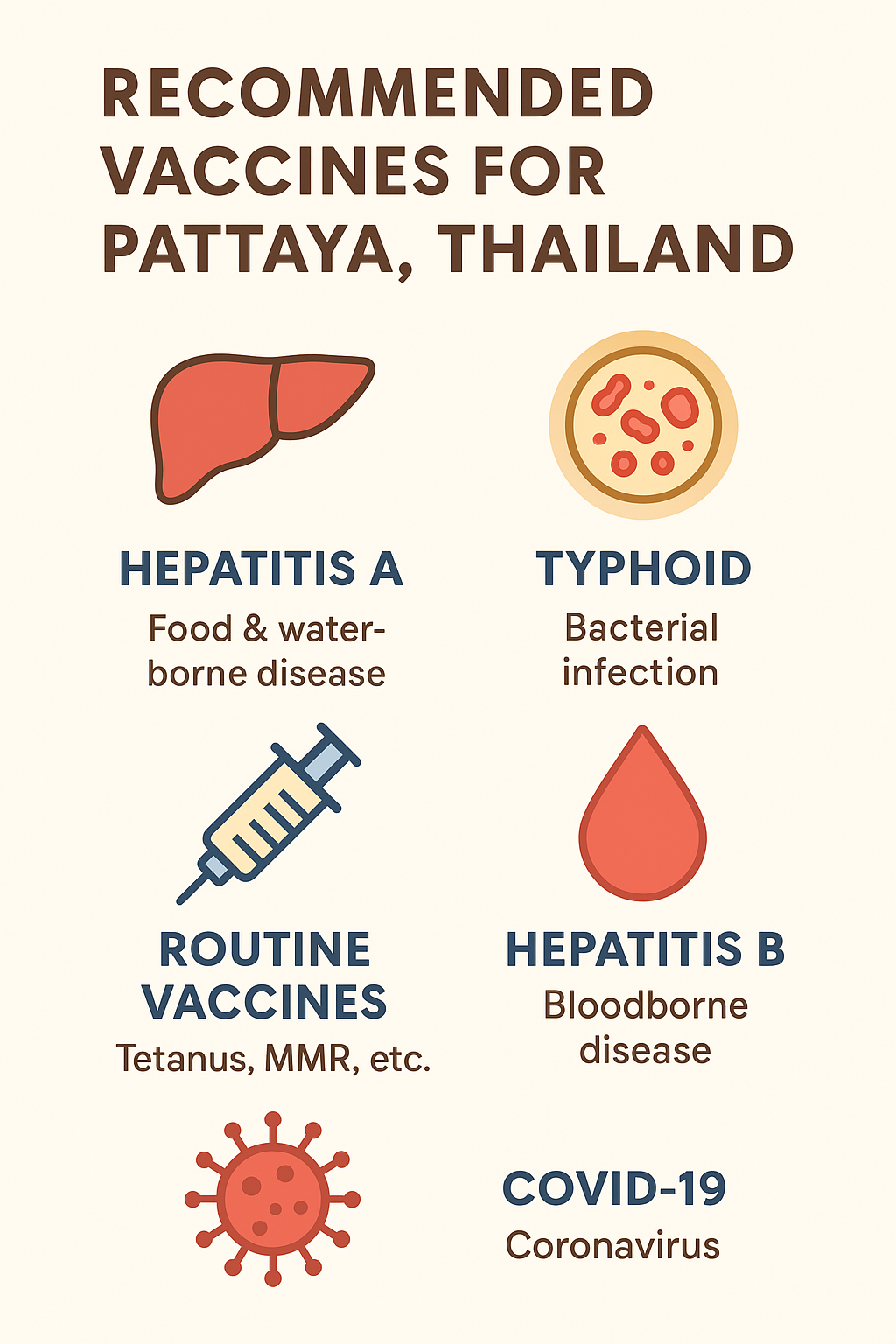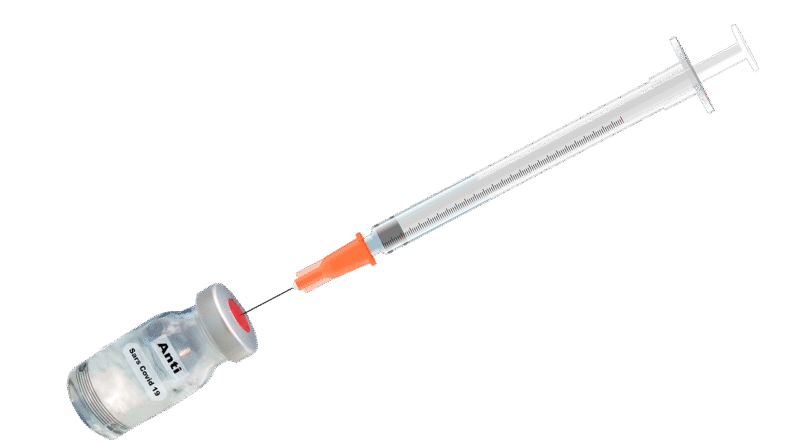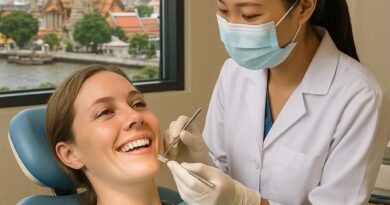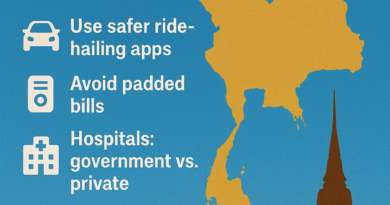Pattaya Traveler Vaccines: Essential Health Checklist for Thailand
Last Updated on October 7, 2025 by admin
Preparing for your first trip to Pattaya, Thailand, involves more than just booking flights and choosing a hotel—it means ensuring your health is protected against local risks. This guide provides an overview of the vaccines and health precautions recommended for travelers from North America and Europe.
While we can outline the standard advice, PattayaGuidebook.com is not a medical provider. The most important step you can take is to consult your personal doctor or a specialized travel health clinic at least 6 to 8 weeks before your departure. This is especially important for vaccines that require multiple doses over several months to achieve full immunity. They know your personal health history best.
Thailand Entry Requirements: When is Proof Required?
This is a common source of confusion. Thailand does not currently require proof of vaccination for entry for travelers coming directly from North America or Europe. You will not be asked for a Hep A or Typhoid certificate.
However, Thailand’s health declaration on arrival cards (TDAC: Thailand Digital Arrival Card) asks you to list countries you have visited in the last 10 days. This is not about routine travel vaccines; it’s a necessary check for serious, high-risk infectious diseases:
- Yellow Fever: If you are traveling from a country where Yellow Fever is endemic (primarily parts of Africa and South America), or if you have traveled through one of those countries within the last 10 days, Thailand mandates that you show proof of Yellow Fever vaccination. This is the primary reason for the health declaration question.
- Other High-Risk Diseases: The question allows Thai health authorities to identify and monitor travelers who may have recently been exposed to other serious outbreaks (e.g., MERS, Ebola) in specific regions.
The Big Five: Recommended Vaccines

No vaccines are legally required for entry into Thailand from the US, Canada, or Europe, but several are strongly recommended to protect against diseases common in Southeast Asia.
1. Hepatitis A (Hep A)
This vaccine is the most frequently recommended for nearly all travelers to developing countries.
- The Risk: Hepatitis A is transmitted through contaminated food or water. Given that much of the delicious Pattaya experience involves street food and bustling markets, this vaccine offers essential protection against infection.
- Protection: It typically requires a series of two shots for long-term immunity.
2. Typhoid
This bacterial disease is also spread through contaminated food and water, specifically impacting the digestive system.
- The Risk: Typhoid is present throughout Thailand, particularly in non-tourist areas and places with poor sanitation.
- Protection: The vaccine can be given either as a single injection or in a series of oral capsules.
3. Routine Vaccines (Tetanus, MMR, etc.)
Ensure all your standard childhood and routine adult vaccinations are up-to-date.
- The Risk: Basic protection against common diseases should be current, including Measles, Mumps, and Rubella (MMR), and Diphtheria-Tetanus-Pertussis (Tdap).
- Focus: Pay close attention to your Tetanus booster status, especially if you plan activities that involve minor cuts or scrapes.
4. Hepatitis B (Hep B)
This vaccine is often recommended for longer stays (over a month) or for travelers who might participate in high-risk activities.
- The Risk: Hepatitis B is spread through blood, unprotected sexual contact, or contaminated medical equipment. This vaccine is highly relevant for all travelers and is essential for sexual health protection.
- Consideration: Crucially, the standard Hepatitis B vaccination requires three shots given over a six-month period to ensure maximum, lasting protection. If you plan on long-term travel, getting tattoos, or seeking medical/dental work, this vaccine is a prudent addition, but requires substantial advance planning.
5. COVID-19
While Thailand has generally dropped mandatory entry requirements, the COVID-19 vaccine remains highly recommended.
- The Risk: Though mandates are gone, the virus is still present, and crowded spaces like airports, markets, and nightlife areas increase exposure. Getting sick while abroad can ruin your trip and incur medical expenses.
- Protection: Consult your doctor about getting a primary series or a bivalent booster (if available and recommended) to ensure maximum protection against current circulating variants.
Sexual Health and Prevention (Crucial for All Travelers)
For many travelers, ensuring protection against sexually transmitted diseases (STDs/STIs) is a primary health concern, particularly in areas with active nightlife.
Hepatitis B
If you have not already completed the series, we strongly urge you to complete the Hepatitis B vaccination course before your trip, as it is a highly infectious blood-borne and sexually transmitted disease.
HPV (Human Papillomavirus)
- The Vaccine: The HPV vaccine (Gardasil 9) protects against the strains most likely to cause cancer and genital warts. It is often recommended by Western health authorities for young adults (up to age 26 in many countries) who have not been fully vaccinated.
- Consultation: Discuss your HPV vaccination status with your doctor, regardless of your age, to see if it is a relevant addition to your travel regimen.
The Most Effective Prevention
No vaccine protects against all STIs (e.g., HIV, Gonorrhea, Chlamydia). Therefore, the most important precaution is consistent, correct use of condoms. They are widely available at pharmacies and even 7-Eleven stores across Pattaya. Some travelers report dissatisfaction at what’s on offer, so bring your own if you have a preferred brand and style.
Situational Vaccines and Pattaya-Specific Risks (Enhanced Specificity)
Rabies
The Rabies vaccine is generally recommended only for high-risk travelers who will be working directly with animals or for long-term travelers in rural areas.
- Pattaya Context: Pattaya is an urban tourist hub, and the primary risk is usually lower than in deep rural Thai villages. While stray dogs are common, the key is knowing that world-class medical care is quickly accessible. If you are bitten by any mammal, immediately seek Post-Exposure Prophylaxis (PEP) at a quality facility like Bangkok Hospital Pattaya—they are experienced in this treatment. To be as safe as possible, avoid dogs and other wild animals.
Japanese Encephalitis (JE)
JE is a rare but serious disease transmitted by mosquitoes.
- The Risk: Pattaya is primarily an urban and coastal area, meaning the risk for JE is very low for typical short-term travelers. JE exposure is usually only relevant for those spending extensive time in rural rice-growing or agricultural areas, especially during the rainy season.
Mosquito-Borne Threats: Dengue & Zika (City Risks)
The most common health threat in Pattaya is posed by mosquitoes, particularly the ones that transmit Dengue Fever. Dengue is a risk even in densely populated urban centers.
- Dengue Fever: This is endemic in Thailand. There is currently no widely available vaccine for travelers. Prevention is your only defense.
- Zika: The risk of Zika is generally considered low, but precautions remain the same.
Prevention is Key: Wear long sleeves and pants at dawn and dusk, and always use insect repellent (DEET is most effective). You can easily purchase high-quality local repellents at any 7-Eleven or pharmacy upon arrival.
Pattaya Reality Check: Virtually no one walking the main streets of Pattaya or Bangkok is constantly applying insect repellent. For most travelers focusing on air-conditioned malls, beachfront promenades, and bustling nightlife, the risk—and therefore the need for constant application—is minimal. We include this section for completeness, as medical authorities worldwide advise it due to the ever-present threat of Dengue.
Official Health Resources (Consult Your Doctor First)
Your primary care physician or a travel health specialist knows your medical history and will determine which vaccines are appropriate for you based on your length of stay, activities, and current health.
| Region | Authoritative Resource |
|---|---|
| United States | Centers for Disease Control and Prevention (CDC): View their specific recommendations for Thailand travel. |
| United Kingdom | National Health Service (NHS) Fit for Travel: Consult the latest guidance for Thailand. |
| European Union | European Centre for Disease Prevention and Control (ECDC): Access health advice for EU residents traveling outside the EU. |
Crucial Reminder: We are a travel guidance site, not a medical authority. Please use the resources above and consult a healthcare professional at least two months before your trip. Getting your vaccinations early ensures you have full immunity before you step off the plane in Bangkok.
And don’t forget to purchase travel health insurance. Motorbike accidents and food poisoning are common in Thailand; don’t think you can do without insurance just because you’re young and healthy. Learn more in our comprehensive guide to purchasing travel health insurance for trips to Thailand.





Pingback: Pattaya First-Time Visitor Guide: Everything You Need to Know - Pattaya Guidebook